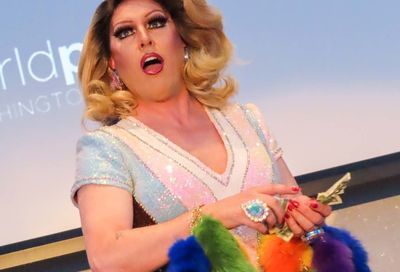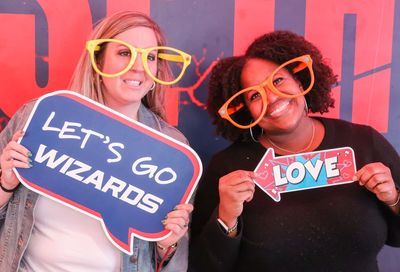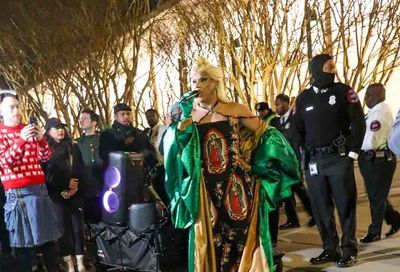Queer people more likely to be stopped by police, study says
LGBQ people are six times as likely to report being stopped by police, and three times as likely to avoid contacting police for help.

A new study from the Williams Institute finds that queer people are six times as likely than the general population to be stopped by police, and have lower levels of trust when it comes to interacting with law enforcement.
Researchers at the Williams Institute, a think tank specializing in LGBTQ-related research, examined data from the Generations Study, a long-term study of three generations of lesbian, gay, bisexual, and queer people, and the Police Public Contact Survey, to determine their findings.
According to the data compiled from the surveys, 6% of LGBQ adults reported being stopped by police in a public space, compared to 1% of the general population.
Nineteen percent of LGBQ people reported being stopped by police while driving, compared to 8% of the general population, and 12% reported being stopped while riding as a passenger in a vehicle, compared to 2% of the general population. The findings were similar across sex and race.
Additionally, twice as many LGBQ people — 22% — approached or sought help from police, as compared to 11% in the general population. Similarly, twice as many LGBQ people reported having police called to a scene after being involved in an accident as the general population.
“The much higher rates of LGBQ adults reporting being approached by the police is consistent with the idea that LGBQ people are over-policed and raises the issue of bias-based profiling of LGBT communities in general,” the report’s authors write in their summary of the data.
While both LGBQ people and the general population overall were satisfied with police response, fewer LGBQ adults agreed that police behaved properly during their contact, with only 81% saying they believed police behaved properly, compared to 91% among the general population.
In particular, LGBQ-identifying women were less likely to report satisfaction with police interactions, with only 69% doing so, compared to 85% of females in the general population.
Even more concerning, one third of female LBQ adults and more than 1 in 5 LGBQ people — both white and non-white — said they would be less likely to contact police in the future due to a negative experience. By comparison, only 6% females overall, 6% of white people overall, and 7% of non-white people overall indicated a reticence to contact police in the future.
See also: 100+ LGBTQ organizations condemn racism, racial violence, and police brutality
Researchers hypothesized that lower reported rates of satisfaction may point to a larger underlying issue: the lack of trust in police on the part of LGBQ people, based on the perception that LGBQ people are more likely to be targeted as suspects or that police do not take crimes directed against LGBQ people as seriously as when a heterosexual victim is involved.
While the data did not include statistics on transgender people, researchers noted that transgender people, especially women of color, have historically had negative experiences with police, such as instances of harassment and assault.
They also suggested that more research could be done to study the impact of policing on vulnerable or marginalized communities, concluding: “As police reform is being discussed nationally, it is important that reforms include attention to policing of LGBTQ populations across race and gender.”
The higher incidence of negative or unsatisfactory interactions with police among LGBTQ people may be one of the driving forces behind efforts to bar police from Pride-related events, on the grounds that their presence may be triggering or discomforting to LGBTQ people, particularly those of color.
NYC Pride recently announced it plans to bar uniformed officers and law enforcement personnel groups from marching in its annual parade, and to keep on-duty officers at least a block away from any Pride-related festivities, instead choosing to rely on private security and volunteers who have received de-escalation training to deal with any problems, skirmishes, or heated confrontations.
Last year, Indy Pride announced it would no longer have uniformed officers participate in Pride, in a move intended to signal the organization’s desire to stand in solidarity with the Black community against police brutality.
Read more:
Mormon professor apologizes after calling gay student an anti-Christ
Queer people stage public protest in Iran after gay man beheaded by family
Support Metro Weekly’s Journalism
These are challenging times for news organizations. And yet it’s crucial we stay active and provide vital resources and information to both our local readers and the world. So won’t you please take a moment and consider supporting Metro Weekly with a membership? For as little as $5 a month, you can help ensure Metro Weekly magazine and MetroWeekly.com remain free, viable resources as we provide the best, most diverse, culturally-resonant LGBTQ coverage in both the D.C. region and around the world. Memberships come with exclusive perks and discounts, your own personal digital delivery of each week’s magazine (and an archive), access to our Member's Lounge when it launches this fall, and exclusive members-only items like Metro Weekly Membership Mugs and Tote Bags! Check out all our membership levels here and please join us today!






















You must be logged in to post a comment.